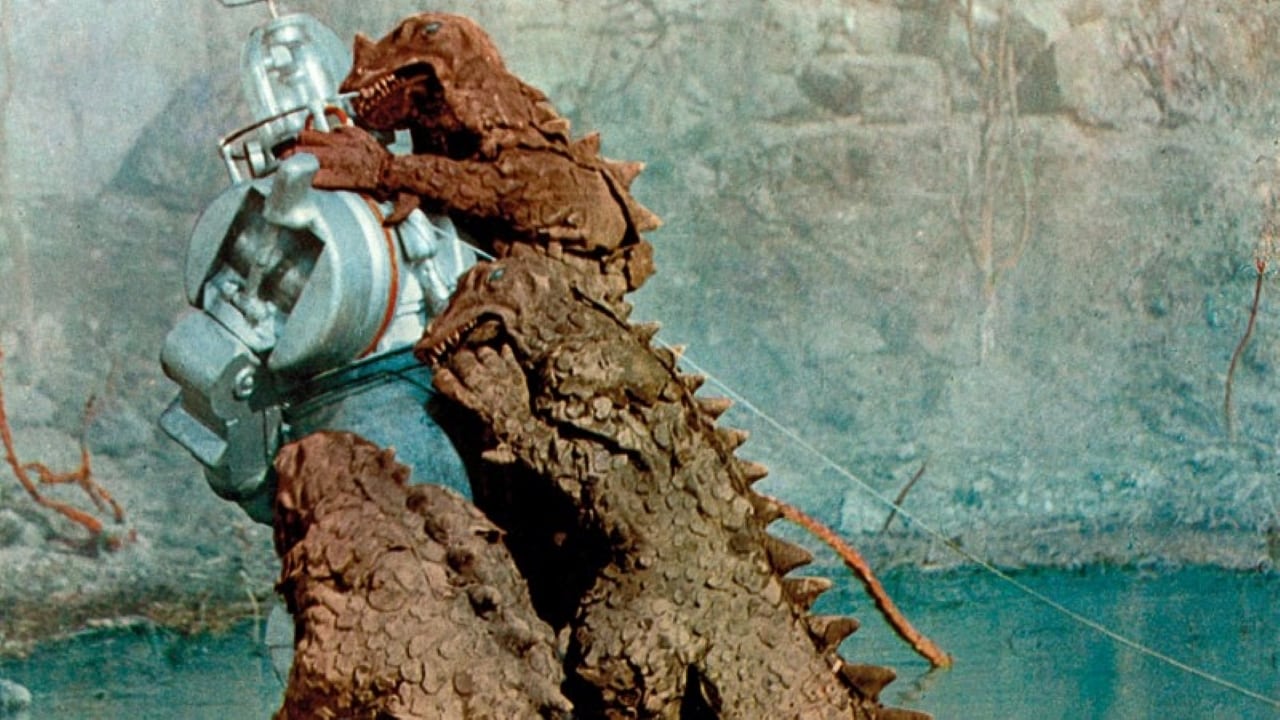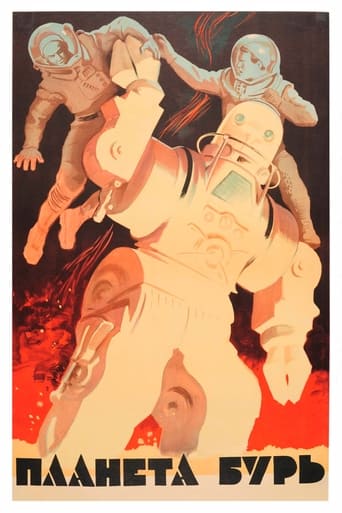

That was an excellent one.
... View MoreLet's be realistic.
... View MoreFantastic!
... View MoreCharming and brutal
... View MoreMy movie memory has the strange habit of sticking often to the movies seen many years ago the place and circumstances in which I saw the movie. I was about ten years old when I first saw the 'Storms Planet'. The year was about 1963, in my native Romania. The recent re-viewing of the Soviet film that was originally called 'Planet Bur' has also brought me a journey in time by watching this film about a space trip. It may have been one of the first science fiction films I've ever seen, if not the first, from a long series that continues until today, because the passion for the genre born in those years has not diminished, but on the contrary . It was probably also one of the first Soviet films that I saw, a singular and quite special film even in the scene of the Soviet cinema of those years.In fact, there was a race in parallel to the space exploration race between the two great superpowers - the Soviet Union and the United States - representing the two political systems that were involved in the Cold War complex system of relations that included armed diplomacy and a balance of nuclear terror. Cinematography as a popular art form with the largest distribution among the general public tried to mirror this competition.As far as we know, 'The Storm Planet' was the only film of fiction directed by Klushantsev. The scientific orientation of the team he worked with is evident in the attention paid to the scientific elements in relation to the lean and conventional structure of intrigue and narrative. If the image of spacecraft does not impress us compared to the effects created on the computer we are used to today, the scenes of imponderability or the naturalistic description of the contact between people and the monsters that inhabit the planet are executed with precision. Even in the perspective of today, after hundreds of science fiction films watched in half a century, some scenes remain for me expressive. Others are less successful, for example, the dinosaur silhouettes with which Klushantsev and his colleagues have populated the planet seem to be taken from the illustrations in a school manual. The intrigue itself does not offer too much reason to comment, it's as complex as an episode of the 'Star Trek' television series that would appear a few years later. Cosmonauts are surprisingly independent, and after one of the three spaceships of the mission is destroyed by a meteorite they decide on their own, with Soviet abnegation, to continue the mission. The two exploring teams are lost momentarily and will look for each other to face the dangers. The only woman in the crew will also have to make a crucial life and death decision. Heroism and devotion to space.Surprising (in good) is the rather small amount of propaganda in a movie that was also intended to respond to similar American films. In a single moment of the film,we are served with a thank-you speech for the Soviet peoples' support. There is also a non-Soviet character, researcher Kern, who has a little of the 'capitalist' ideas but is still a positive character. We are told that he is funded by an independent group of researchers. The concept of an international mission was not born yet, but we are on the right track. The Americans would reciprocate with the presence of Commander Chekhov on the command deck of the first Star Trek mission. Kern is also the manipulator of the John robot, which is pretty well done as a cinematic vision, and one of the first robots in the history of the film capable not only of intelligence and a spirit of sacrifice but also of a sense of humor. The film is less good in what concerns the costumes worn during the orbital voyage, the style of the elegant space uniforms has not yet come.The film's scientific aspects also include some weaknesses. The choice of the planet Venus as a target of exploration reflects the state of scientific knowledge existing in the early 60's. The atmospheric conditions on Venus (as well as Mars otherwise) were little known and both the Soviets and the Americans sent automatic probes to both planets. Subsequent data (largely provided by the Soviet probes) would show that the atmosphere of Venus is composed of poisonous gases, temperatures and atmospheric pressure are extremely high, and life as imagined in the film is virtually impossible. In one field, the authors stumbled precisely - the storms. Otherwise, the opening of the space helmet on the surface of the planet as it happens in one of the scenes would immediately kill the astronauts. Overall it's a piece of nostalgia worth viewing or re-viewing.
... View MorePeople in the United States most likely know that in the '50s and '60s, Hollywood made a number of movies about people traveling to other planets. It turns out that the Soviet Union also made one. Pavel Klushantsev's "Planeta bur" ("Planet of the Storms" in English). It's a typical corny, enjoyable sci-fi flick. The destination in this case is Venus, and the cosmonauts get more than they bargained for. The robot was funny.I understand that Curtis Harrington and Peter Bogdanovich each individually took the movie, added new scenes, and released it under different titles. Well, I doubt that I'll ever be interested in the adulterated versions. I prefer this original. Had the Soviet Union celebrated Halloween, I bet that millions of children would have dressed as that robot.Fun movie.
... View MoreThis movie is one of them campy sci-fi films which i'm actually watching right now. If you like something like lost in space you'll like this but it's way better. Great special effects make this a movie you should check it out about space people on Venus who get attacked by aliens who look like dinosaurs. good movie not much action but a robot who looks like the one from Lost in Space. Check it out! it's good there are underwater bits in it and for its time must of been pretty hard to capture in the sixties. This is the only Russian film i've seen and it's pretty funny actually. it seems stupid especially the scene with the octopus hardly realistic.
... View MorePavel Klushantsev, who directed more Russian SF films than he's credited with here, found himself propelled from obscurity into sudden demand by the Soviet authorities when the production of his 1958 SF debut, 'Road to the Stars' coincided with the launch of Sputnik. Although he languished in almost total obscurity in the West, his films were enormously popular in the USSR, and, as a recent documentary noted, many of his cinematic innovations were 'borrowed' 10 years later by Kubrick in '2001'.Planet of Storms is not a great movie, but compared with most of the SF which the USA was churning up to this time, it's positively stellar. It's weakest points are its sketchy characterisations, and rather poor pacing, but hard SF luminaries like Gernsback and John Campbell would probably have admired its attention to detail, and relative lack of sensationalism. The film actually begins with the disclaimer "Venus may well be entirely different to this" (or somesuch), and what follows is a serious attempt to depict a Venusian expedition - marred perhaps by the odd dinosaur, but surprisingly free of Soviet chest-thumping.Planet of Storms won't blow your mind, but you'll find yourself being charmed by the ingenious photography, sets, creatures, etc. There's also a straight out hilarious scene where the Robot gets rained on, and goes off his head. While his two human companions are lying on the ground, dangerously ill from fever, he's babbling on about building a concrete highway to reach the other half of the expedition, who are are about 20 miles away. Contacting him via radio, they are somewhat alarmed to hear him tell them "According to quotes from the Smith corporation, the cost of building a highway to the Sirius is 37 million dollars". I don't know if this was a dig at capitalism, but it cracked me up anyway. Now - some bloke wanted a translation of the lyrics to the song. These are courtesy of SBS TV Australia (translated by Elena Mikrailik and Brendan Doyle)(first version)Planet of Storms, we thank you for your lessons / We enjoyed our stay, but now we must be gone / Our ship awaits; our way is clear and straight / Our hearts are calling, "home, home home" / Yes, home, dear Comrades // It's time to calculate the points of bearing / It's time to place our courage at the helm / She waits for us, the planet of our birth / Our dear home; our one and only Earth / Yes, Earth / Earth, dear Comrades //(end of movie version)Planet of Storms, we'll see you soon, don't worry / And in your harbour, our ships will gladly berth / For not in vain are we the sons of Earth / For not in vain are we the sons of Earth / Earth, dear Comrades
... View More